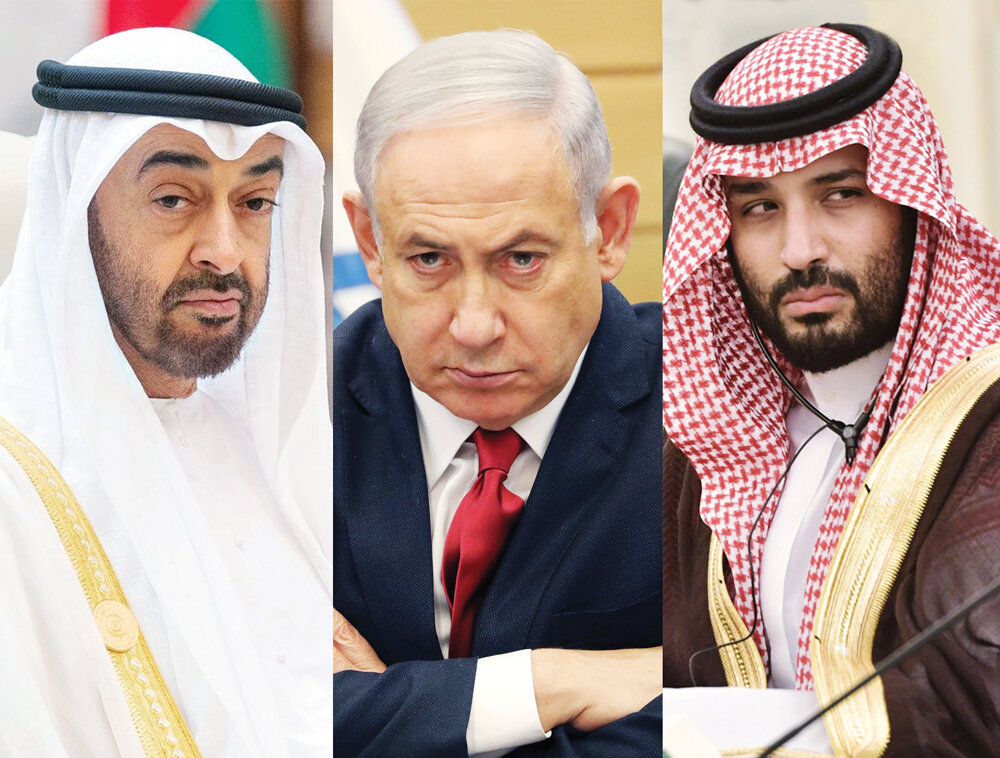War on Gaza reveals Saudi-Emirati bromance with Israel

TEHRAN – While most Islamic and Arab as well as other states strongly condemned Israeli atrocities against civilians in Gaza and elsewhere in Palestine, Abu Dhabi and Riyadh adopted a low-key approach toward the latest round of Israeli violence against the Palestinian people.
As the war on Gaza continues to rage on, anger and frustration among public opinion in the Arab world are being directed at Saudi Arabia and the United Arab Emirates for their inaction on the Israeli crimes against the Palestinians. These two states, along with their allies such as Bahrain, have largely refrained from providing support, at least morally, to the besieged people of Gaza.
The UAE, which normalized relations with Israel last year, remained silent on the Israeli war on Gaza. Instead, it expressed sympathy with what it called “victims” in Israel. To apparently balance its position, the UAE also dryly voiced sympathy with the Palestinians fallen victims to the Israeli warmongering.
UAE Foreign Minister Sheikh Abdullah bin Zayed Al Nahyan issued a belated statement on the crisis in Palestine saying that he was concerned about the violence there.
He “has expressed the UAE's grave concern over the escalating spiral of violence in Israel and Palestine and offered condolences to all victims of the recent fighting,” according to the UAE Foreign Ministry’s statement.
“The UAE is alarmed by the escalating spiral of violence in Israel and Palestine. We express our condolences to all victims of the recent fighting, and join others in calling for an immediate cessation of violence and hostilities. The UAE calls on all parties to take immediate steps to commit to a ceasefire, initiate a political dialogue, and exercise maximum restraint,” the chief Emirati diplomat continued.
The statement equated the Palestinians with the Israelis as if it was the Palestinians who are occupying and besieging the Israelis. Israel, which is the only possessor of nuclear weapons in the region, bears ultimate responsibility for what’s happening in Palestine. The latest round of fighting began after Israel moved to evict Palestinian families from their ancestral homes in Jerusalem’s Sheikh Jarrah neighborhood, something that left the Palestinians with no option but to hit back. Also, Israel’s provocative move in desecrating Muslim sanctities in al-Quds (Jerusalem) plays a major role in provoking the Palestinians to push back against Israel. Israel killed defenseless children and women in Gaza and desecrated places of sanctity for Muslims in Jerusalem (al-Quds) especially the al-Aqsa Mosque, which stands as the first Qiblah (direction of prayer) and the third-holiest site in Islam.
But all this apparently was not enough for the UAE to take a stand against Israel. Abu Dhabi has been increasingly tilting toward Israel since it normalized relations with Tel Aviv. In the beginning, it was thought that the UAE normalized relations with Israel under pressure from the Trump administration. But now that Israel blatantly violates human rights in Palestine, the UAE showed that its decision to establish ties with Israel goes far beyond Trump’s pressures.
The same goes for Saudi Arabia, though the Saudis have not yet normalized relations with Israel. Of course, at the official level, Saudi Arabia has sought to distance itself from the Israelis’ crimes in Palestine. However, a close examination of Saudi media coverage of the war on Gaza indicates Riyadh’s low-key approach to the war. Saudi Arabia condemned the Israeli attack against the Al-Aqsa Mosque but it stopped short of sanding by the Palestinians in the Gaza Strip.
In fact, Saudi Arabia even gave airtime to Israeli officials to justify their crimes against Palestinians. For example, the Saudi-own Al Arabia news television hosted Avichay Adraee, the Arabic-language spokesman for the Israel army, twice over the past few days. During his appearances on Al Arabiya, the Israeli mouthpiece was explaining why Israel was right to kill defenseless children and women in Gaza.
The Saudi and Emirati indifference to the Palestinians’ sufferings sparked outrage on social media platforms in the Arab world. It also cast doubts over their willingness to mend ties with Iran, which strongly condemned Israel’s atrocities against the Palestinians. Security officials from Iran and Saudi Arabia have held behind-the-scenes talks in Baghdad. The talks have so far produced no concrete results and they are expected to become even more complicated after the Israel-Gaza flare-up as it showed that the Saudis and Emiratis have tilted too much toward Israel, something that Iran considers a grave national security threat.
